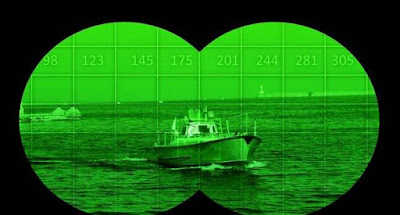US Military already has smart bombs, smart bullets and now DARPA making guided artillery shells
by noreply@blogger.com (brian wang) from NextBigFuture.com on (#29NSG)
DARPA has created the Multi-Azimuth Defense-Fast Intercept Round Engagement System (MAD-FIRES) program to design and develop technologies associated with a medium-caliber guided projectile It will combine the guidance, precision and accuracy generally afforded by missiles with the speed, rapid-fire capability and large ammunition capacity afforded by bullets.
MAD-FIRES aims to advance the state-of-the-art in defensive gun systems by creating a new, low-cost technological foundation for guided, gun-launched projectiles. Specifically, MAD-FIRES aims to incorporate enhanced ammunition rounds able to alter their flight path in real time to stay on target, and a capacity to continuously target, track and engage multiple fast-approaching targets simultaneously and re-engage any targets that survive initial engagement.
Envisioned benefits of MAD-FIRES for future systems include:
Smarter munitions are needed to cope with smaller threats against US naval ships, such as small motorboats and drones. Attacks by unmanned vehicles, missiles, small planes, fast in-shore attack craft and other platforms pose a perennial, evolving and potentially lethal threat to ships and other maritime vessels. The escalating risks posed by these ever-morphing threats demand that vessels have access to defensive capabilities at the leading edge of air and surface combat technologies. In particular, current close-range gun systems would greatly benefit from an ability to engage multiple and diverse targets coming from a range of directions and do so rapidly and with high precision.
Raytheon already has excalibur shells. They are guided by external fins that pop out after firing and it claims they achieve around 2 meters (6.5 feet) of accuracy with a range of 50km (31 miles). The company already has a smaller version for naval use under development that might be useful for this contract.
DARPA wants to keep costs low enough for mass deployment but accurate enough to be useful against smaller targets.
Read more










MAD-FIRES aims to advance the state-of-the-art in defensive gun systems by creating a new, low-cost technological foundation for guided, gun-launched projectiles. Specifically, MAD-FIRES aims to incorporate enhanced ammunition rounds able to alter their flight path in real time to stay on target, and a capacity to continuously target, track and engage multiple fast-approaching targets simultaneously and re-engage any targets that survive initial engagement.
Envisioned benefits of MAD-FIRES for future systems include:
- Improved real-time defense against evolving air and surface combat threats, facilitated by:
- Extreme precision
- An ability to defend against greater numbers of simultaneous and diverse attacks
- Decreased per-engagement costs by a factor of 10 or more
- Potential future applicability to air and ground platforms

Smarter munitions are needed to cope with smaller threats against US naval ships, such as small motorboats and drones. Attacks by unmanned vehicles, missiles, small planes, fast in-shore attack craft and other platforms pose a perennial, evolving and potentially lethal threat to ships and other maritime vessels. The escalating risks posed by these ever-morphing threats demand that vessels have access to defensive capabilities at the leading edge of air and surface combat technologies. In particular, current close-range gun systems would greatly benefit from an ability to engage multiple and diverse targets coming from a range of directions and do so rapidly and with high precision.
Raytheon already has excalibur shells. They are guided by external fins that pop out after firing and it claims they achieve around 2 meters (6.5 feet) of accuracy with a range of 50km (31 miles). The company already has a smaller version for naval use under development that might be useful for this contract.
DARPA wants to keep costs low enough for mass deployment but accurate enough to be useful against smaller targets.
Read more